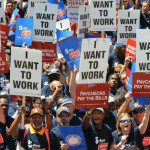Saying the state needs to attract business and pay back the feds, a House panel on Friday approved an unemployment compensation bill that cuts benefits to workers and reduces taxes on employers.
 By a 12-5 vote, the House Economic Affairs Committee approved HB 7005, a major re-write of state unemployment compensation rules that reduces the duration recipients can collect, shifts the burden of proof in appeals and ties the length of benefits to the strength of the economy.
By a 12-5 vote, the House Economic Affairs Committee approved HB 7005, a major re-write of state unemployment compensation rules that reduces the duration recipients can collect, shifts the burden of proof in appeals and ties the length of benefits to the strength of the economy.
The length of time the state would pay benefits to the unemployed would go from the current 26 week maximum to as little as 12 weeks depending on the unemployment rate if the House version of the bill becomes law.
The Senate has a bill (SB 728) seeking to make it less likely that the state will pay out unwarranted unemployment compensation, but the Senate measure doesn’t include the reduction in the length of eligibility as the House does.
The House measure now is ready for the floor with lawmakers scheduled to start their regular session March 8.
The committee vote Friday came after more than an hour of testimony from business groups, who said the changes would create jobs and help struggling businesses survive, and critics, who said the measure places the burden of replenishing the state unemployment fund squarely on the backs of the jobless.
“The state of Florida has positioned itself, this year in particular, to maintain and expand a business friendly environment,” said Rep. Doug Holder, R-Sarasota and sponsor of bill. “The reason we are trying to do that is to attract businesses so they will provide new jobs for unemployed workers. We want new industry in Florida.”
Democrats on the panel criticized the effort, saying the depth of the recession has made it especially difficult for unemployed Floridians to find work and provide for their families. In the rush to shore up the state’s economy, lawmakers are overlooking the human element.
“Where are those compassionate conservatives you talk about?” Rep. Jim Waldman, D-Coconut Creek asked. “There is no compassion here.”
The state’s unemployment reserves were exhausted in August 2009. Since then, the state has borrowed more than $2 billion from the federal government to be able to pay unemployment claims.
Major provisions of the bill would:
-Reduce the maximum duration of state benefits from 26 to 20 weeks.
-Tie the length of benefits to the state unemployment rate. Benefits would last 20 weeks if the unemployment rate is 9 percent or higher, but would fall as low as 12 weeks as the economy improves.
-Make it easier for employers to deny benefits based on worker misconduct by expanding the definition to include chronic tardiness and absenteeism.
-Shift the burden of proof away from workers in appeals of benefit rejections, by striking changes placed in the law in 2003 that require conflicting or uncertain assertions to be ruled in claimant’s favor.
-Roll back employer contributions by 10 percent.
The 12-5 vote was along party lines, with the Democrats against the bill.
Also testifying Friday was Randall Webster, a former affordable housing executive who has been out of work for more than a year and said he wanted to give lawmakers a face for their discussion.
“The jobs aren’t there,” said Webster, telling legislators he works on finding a job every day. “Finding employment is a full time job. When you are worried about putting food on the table, it makes it even more difficult.”
Backers of the legislation said the ultimate goal should be to give legislators a paycheck so they don’t need an unemployment check.
“For our state’s Unemployment Compensation system to be successful, we must move toward implementing a system of re-employment,” said Rep. Dorothy Hukill, R-Port Orange, chairwoman of the House Economic Affairs Committee. “This bill fosters workforce development and training for those receiving benefits, resulting in a stronger system that emphasizes re-employment rather than merely awarding benefits.”
Karen Woodall, an advocate for the unemployed with the Florida Center for Fiscal and Economic Policy, said Florida already ranks near the bottom of states in terms of benefits paid and the percentage of unemployed who qualify for benefits. To further reduce benefits to shore up the trust fund was “unconscionable,” she said.
Woodall also unsuccessfully urged panelists to amendment the bill to allow workers to report their last two quarters of employment when calculating benefits. The revision would make benefits available to additional workers, many of whom are employed in agriculture, whose jobs are more seasonal in nature, and sometimes can’t collect unemployment.
Florida is among a handful of states that do not base unemployment payments on the last two quarters. Changing the law would cost employers about $51 million a year.
Backers of the bill include several business organizations, including the Florida Chamber of Commerce, Associated Industries of Florida and the Florida United Businesses Association.
By Michael Peltier


